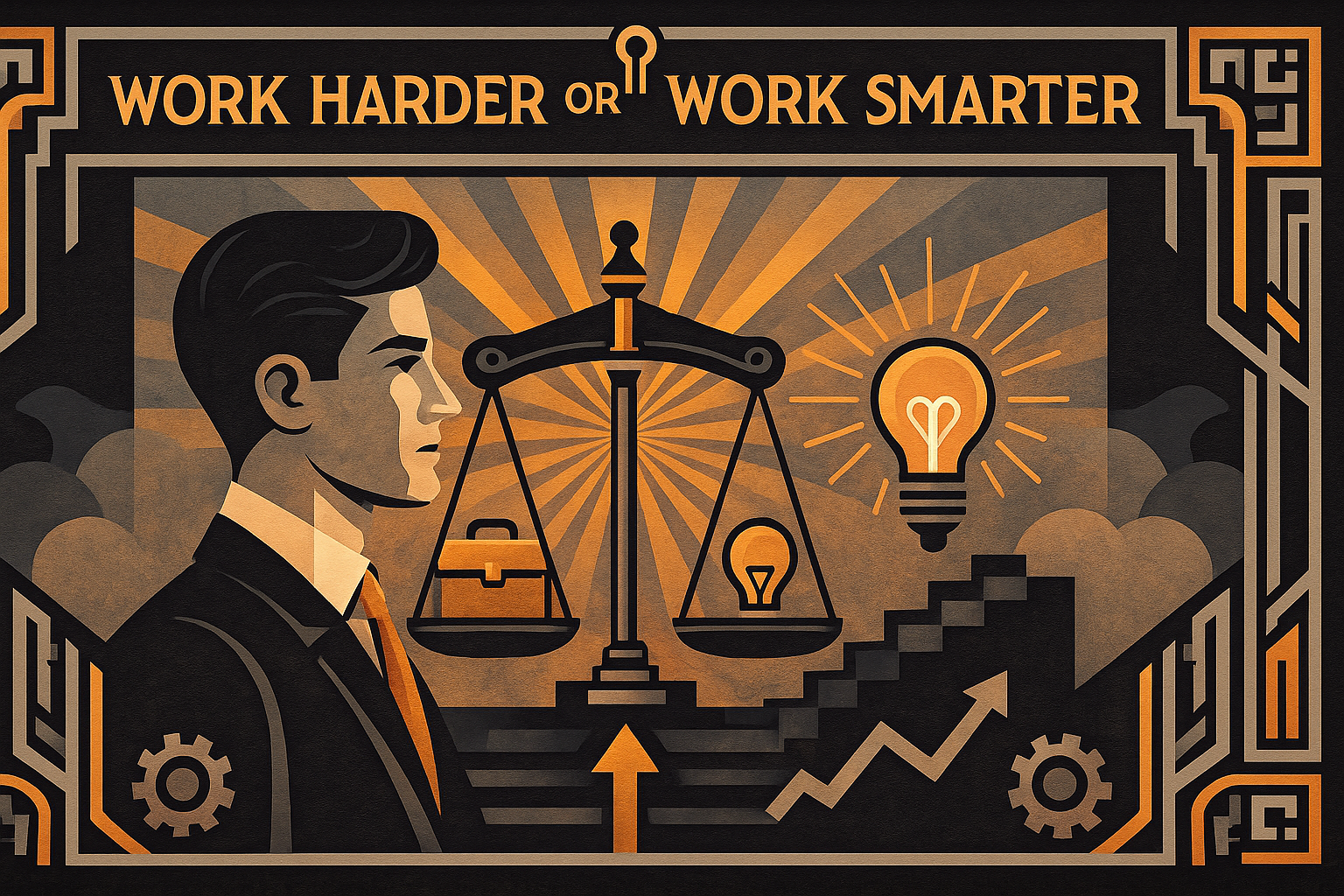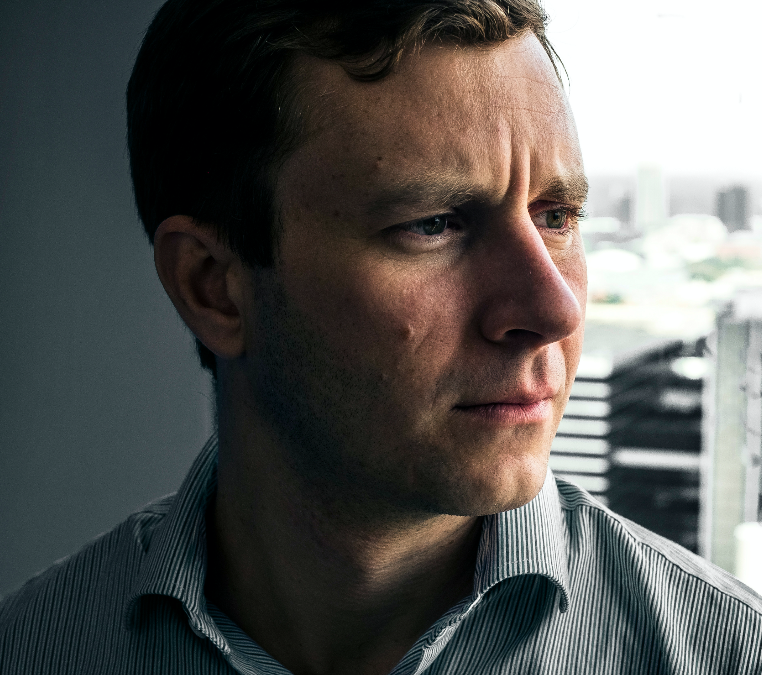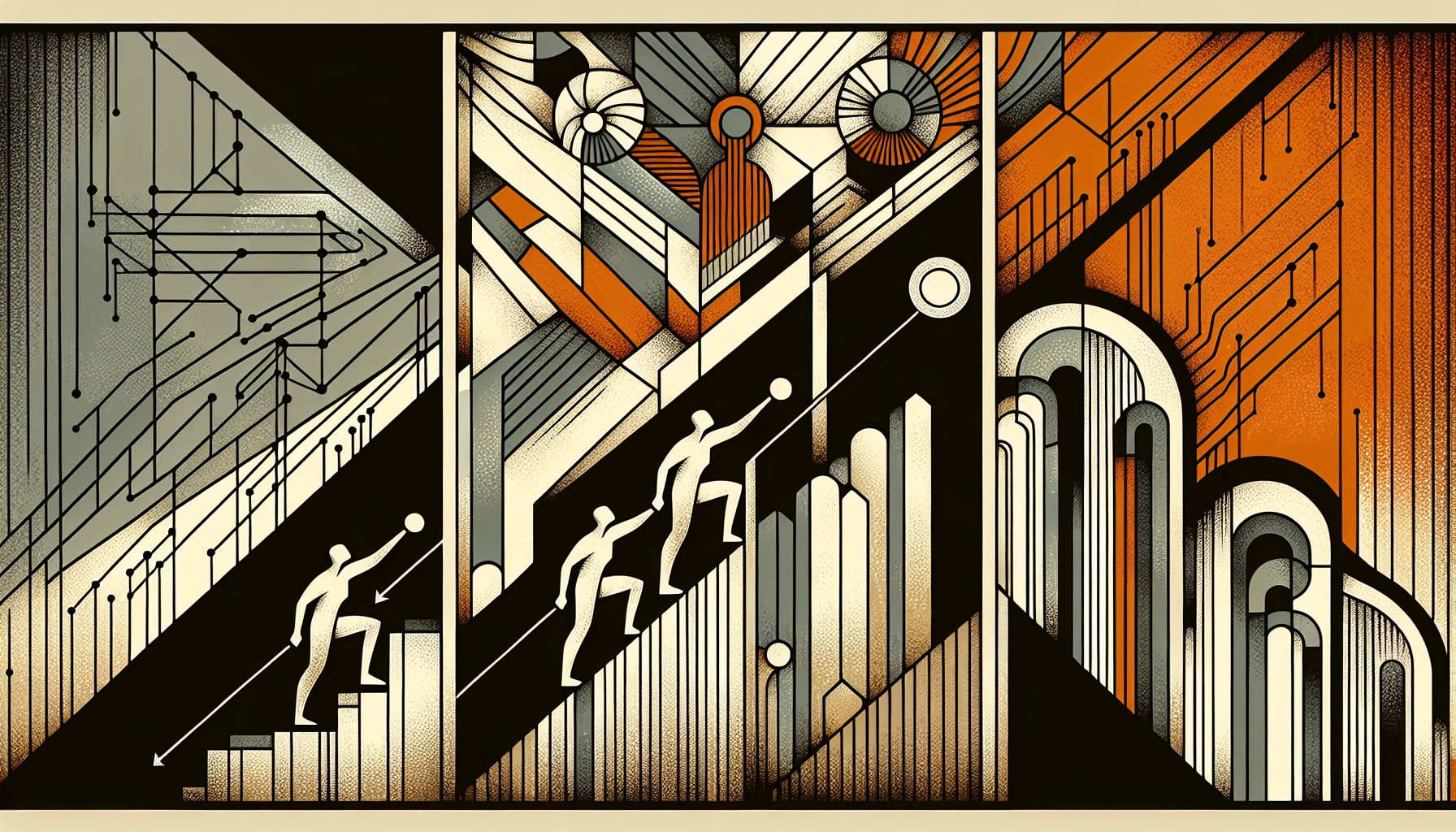Work Harder or Work Smarter: Balancing Hustle & Strategy in Your Early Career

Early in your career, it’s easy to get caught up in the “work harder” mantra. You might feel the pressure to put in long hours and prove your dedication through sheer hustle, and there is some truth to it. But is working harder the only path to success? The truth is, you don’t have to choose between hustle and strategy – the key is finding the right balance so you can advance your career without burning out, which is more common (and more damaging long-term) than you might think when you are just starting out.
The Hustle Culture Trap: When Hard Work Goes Too Far
We’ve all heard the slogans like “rise and grind” or “no days off” or "I'll sleep when I'm dead." Ha! That last one was a personal favorite of mine years ago. Hustle culture glorifies working as hard as possible, often treating exhaustion like a badge of honor. You may have even heard of a 9-9-6 work culture (9am - 9pm, 6 days/week) becoming the new normal in some tech companies. Early in your career, it’s natural to want to go above and beyond – taking on extra projects, working long hours, always being available – to show your dedication. Hard work does matter – it shows commitment and can lead to new opportunities. However, there’s a fine line where extreme hustle stops being effective and starts being counterproductive.
Working endlessly without a clear purpose can lead to diminishing returns. Productivity isn’t proportional to hours worked once you go beyond a certain point. In fact, research shows productivity drops sharply after about 50 hours per week, and falls off a cliff beyond 55. Those 80-hour grinds that some idolize aren’t heroic – they’re inefficient. Fatigue saps your creativity and leads to more mistakes. Pushing yourself to exhaustion day in and day out doesn’t guarantee better results; it mainly guarantees that you’ll be more tired and prone to burnout.
Overwork doesn’t just hurt your performance – it can also hurt your health. Lack of sleep and chronic stress from long hours increase the risk of errors and illness. In one survey, 53% of young professionals reported feeling burned out at least once a week – and those who burn out frequently are far more likely to be planning to leave their job soon. Or even leaving their careers in search of a different line of work and lifestyle. In other words, an all-hustle approach can put both your well-being and your career progress at risk.
Working Smart: How Strategy Trumps Endless Busyness
If hustle culture is about doing more, the “work smarter” mindset is about doing what matters. Working smart means being strategic and intentional with your time and energy. It’s the difference between being busy and being productive. Rather than measuring your value by hours clocked or emails sent at midnight, you focus on activities that have the most impact on your goals.
It starts with clarity of purpose and priorities. Early in your career, it’s crucial to identify what skills, projects, and relationships will advance you toward your long-term goals. Instead of blindly saying “yes” to every request, pause and ask: Does this task align with my goals, or help me grow and get noticed? Working smart often means prioritizing the high-impact tasks over the trivial busywork. It might feel strange to slow down at first if you equate busyness with success, but this mindset shift truly pays off. It also forces you to make decisions and say "No," which is another critical skill to develop in your early career. Individuals with incredible careers have many, many opportunities (great ones!), but they can't say 'yes' to all of them. They have to choose and so do you. So start practicing that mindset now.
A classic productivity concept is the 80/20 rule: a minority of tasks produce the majority of results. Identify those high-impact tasks and prioritize them. For example, putting extra effort into a high-visibility project or learning a valuable new skill will do far more for your career than instantly answering every minor email. High performers focus on what moves the needle, rather than drowning in busywork. It also helps to leverage technology and smart techniques to streamline your work. Using tools that automate routine tasks or scheduling focused “deep work” sessions can help you accomplish more in less time. The less time you waste on low-value busywork, the more time and energy you can devote to the projects that really matter. Finally, remember that being busy isn’t the same as being effective. Pay attention to how you work best – schedule challenging tasks for when you have the most energy, and take breaks to recharge. After all, a well-rested, focused mind produces better results than a fatigued one.
Balancing Hustle with Strategy: The Sweet Spot for Growth
So, how do you find the work harder / work smarter balance? Early career success requires a blend of both. Hard work – putting in effort and going the extra mile – is undeniably valuable, and many opportunities come to those who show initiative. But hard work alone is not enough if it’s not guided in the right direction. That’s where strategy comes in: you need to work hard on the right things.
Balancing hustle with strategy starts with a shift in mindset: focus on outcomes, not just output. Instead of asking, “How many hours can I put in?” start asking, “What results do I want to achieve, and how can I get there most effectively?” This perspective helps you channel your work ethic into actions that truly drive your career forward. For example, if you tend to take on every project that comes your way, try prioritizing one or two key projects where you can really shine, rather than stretching yourself thin across many minor tasks.
Crucially, remember that rest is a part of success. If your career is a marathon, you can’t sprint the whole way without breaking down. Taking care of your health – getting enough sleep and having a life outside work – actually improves your job performance. When you’re recharged, you bring more creativity and clear thinking to your work, which leads to better results.
On the other hand, being strategic doesn’t mean avoiding hard work. It’s about picking your spots. There will be crunch times – a big deadline or a team crisis – when you need to hustle. Embrace those moments; they’re chances to prove yourself. But even then, keep the strategic perspective: make sure your extra effort is going into something that truly matters. Working hard and working smart are not opposites – when you combine them, you create a powerful engine for growth. Hustle provides momentum, and strategy provides direction. With both, you can go further, faster.
Practical Strategies to Work Smarter in Your Early Career
Balancing hustle and strategy is a mindset shift, but it also helps to have some practical habits to put it into action. Here are a few concrete strategies early career professionals can apply right away:
- Set Clear Goals for Yourself: Take the time to define what success looks like in your role and in your near future. When you have clear goals – whether it’s mastering a certain skill, earning a promotion, or completing a key project – you can align your hard work with those objectives. This ensures you’re hustling in the right direction, not just spinning your wheels.
- Prioritize Ruthlessly: Start each week or day by identifying the top two or three tasks that will have the biggest impact on your team or your professional development. Do those first when your energy is highest. By focusing on high-impact work (and sometimes politely pushing back or delegating lower-impact busywork), you make smarter use of your time.
- Learn to Leverage Mentors and Peers: Working smarter doesn’t mean working alone. A mentor or experienced colleague can help you identify where to focus your efforts. Don’t hesitate to ask for guidance. If you’re unsure how to tackle a problem, spending an hour seeking advice could save you many hours of wasted effort.
- Use Tools and Technology to Your Advantage: Use tools that streamline your work – if a software can automate a repetitive task, leverage it. For example, scheduling emails or using report templates can free up time for more important work. The less time you spend on drudgery, the more you can focus your hustle on creative, high-value tasks.
- Set Boundaries to Protect Your Energy: Learn to say “no” when necessary to protect your well-being. For example, set a rule not to check work email late at night or make sure you take a real break at lunch to recharge. Protecting your personal time will actually improve your work performance – you’ll have more focus and energy when you’re on the clock. Remember, burnout helps no one, so maintaining healthy boundaries is key to sustaining your success.
Conclusion: Hustle with Purpose, Grow with Balance
Building a successful career isn’t about choosing between working harder or working smarter – it’s about blending the two. By working hard with a smart strategy, you’ll build a reputation as someone who is both diligent and thoughtful. Ultimately, “work smarter, not harder” doesn’t mean avoiding hard work; it means doing it wisely so you don’t burn out. If you channel your effort with purpose, you can achieve great things and still have a life outside of work. So go ahead and hustle – just make sure you have a strategy and balance to go with it. Your future self will thank you for working not just harder, but smarter.
Give Your Career an AI Boost
Subscribe to our newsletter for more insider tips on growing your career with AI + data.




